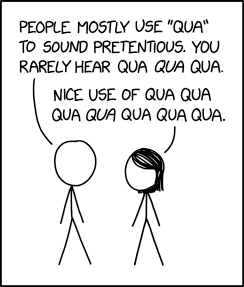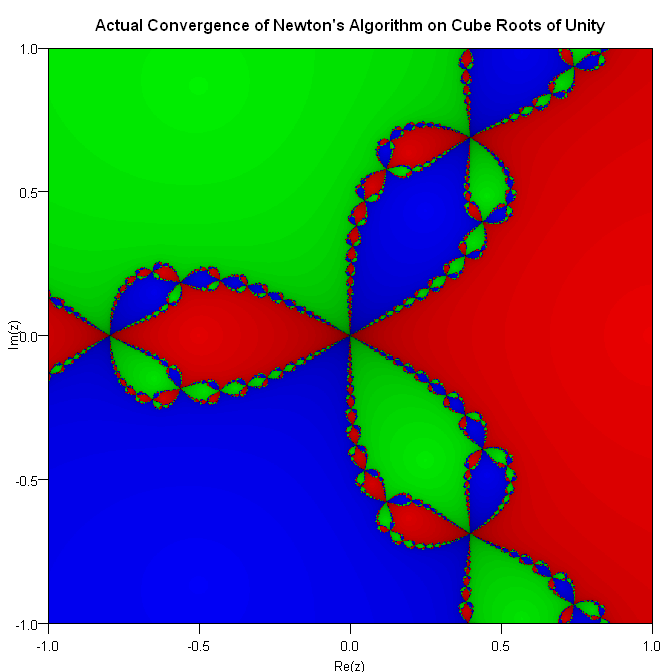XKCD: Qua
Tagged:Beauty
/
Obscurantism
/
TheDivineMadness
/
ϜΤΦ
XKCD qua XKCD is just XKCD. Latin does things to your mind.
Qua
Qua is perfectly cromulent Latin, originally meaning something like “which”, declined from the word for “who” (qui/quae/quod).
In not-quite-so-modern English, it’s another matter.
- When you say “X qua Y”, you mean “X in its role as Y”. For example: “budget qua politics” is speaking of a government budget as a poltical instrument.
- When you say “X qua X”, it’s a fussy, sorta-academic way of saying “X in its own capacity as X, not as a symbol or instrumentality of anything else, just X itself.” So you could say you’re discussing the “budget qua budget”, meaning just the budget as a way of allocating resources, not as a statement about power, or politics, or a sociological statement about the general level of wealth and poverty… just as a budget.
 Until yesterday’s XKCD #2591. [1]
Until yesterday’s XKCD #2591. [1]
- Cueball is basically saying, “You rarely hear people say ‘qua’ just to mean intself”, but doing so in the most convoluted, self-referential, recursive way you can think.
- Except then, his conversational partner Megan goes one level further! He said “qua qua qua”, usually a reference to Lucky’s speech in En Attendant Godot [2], but she noted that he used it to mean itself. So, if we add some parentheses to guide your parse, she’s noting that he said “(qua qua qua) qua (qua qua qua)”! (Though, in fact, Lucky in En Attendant Godot is using “qua” as a nonsense word, so he is actually using “qua” qua “qua”!)
-
Except then, the mouseover text (visible here, also) is even better. Inserting some parentheses to make it easier to parse:
(Qua qua qua) is the (sine qua non) of ((sine qua non) qua (sine qua non)).
(Say it out loud. It’s got rhythm. If there were semioticists who rapped in Latin, they would say this. Or maybe the jump-rope chant of a very strange school where I would be perfectly at home.)
Sine qua non is a Latin tag – “without which nothing” – used in English to denote something essential; if you take it away the very nature of the rest is drastically different. For example, intelligent deduction is the sine qua non of Sherlock Holmes. If you take away this ability, he no longer looks like your mental image of Sherlock Holmes; he’s just a guy in a funny hat smoking an absurd-looking pipe.
So this sentence is… as revoltingly & self-referentially recursive as you think it might be. Probably a fixpoint Y combinator in there somewhere.
The Weekend Conclusion
At least they didn’t use “per se” per se.
Notes & References
1: R Munroe, “Qua”, XKCD #2591, 2022-Mar-10.
As usual, ExplainXKCD has the goods on this one, if you feel you need more explanation.
Also, fun fact: for any non-negative integer $n$, you can repeat “qua” $2^n - 1$ times in a row and be grammatically correct, if unintelligible. (Including $n = 0$.) ↩
2: S Beckett, “En Attendant Godot (Waiting for Godot)”, 1953. “Qua Qua Qua” is from Lucky’s speech in Act I, upon being ordered to “think”. ↩

Gestae Commentaria
Quoi? :)
Tu as bien employé quoi qua quoi. Féliçitations!